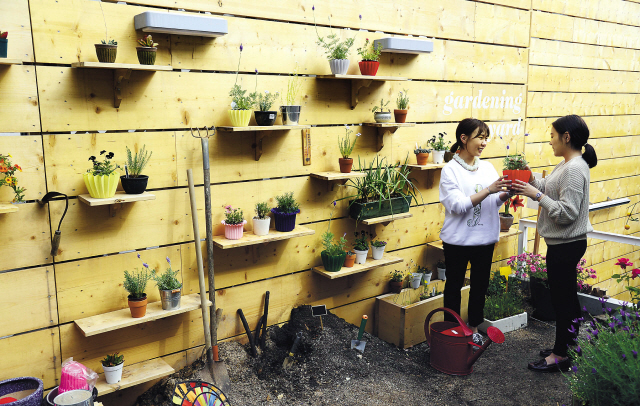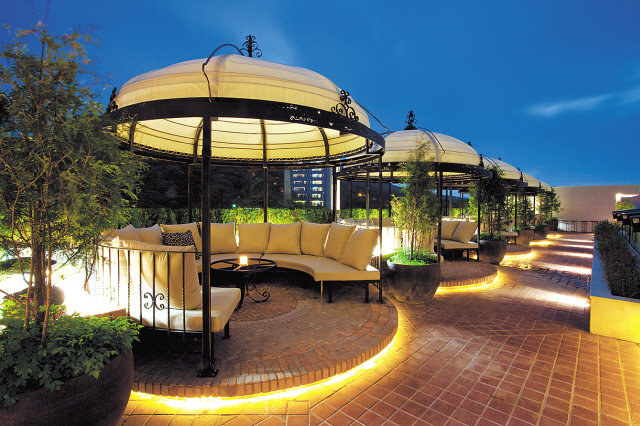 |
Customers at MO jain song can buy the plants grown at the store and take them home. (Park Hae-mook/The Korea Herald) |
Cherry tomatoes, still green, soak in the summer sun, taking their sweet time to ripen. Romaine lettuce blooms in long, emerald stalks.
The roof garden at Garosu-gil-based cafe Able is a pastoral scene of rustic charm, a scene that seems to be in tune with today’s “healing” and “well-being” trends.
“We felt the need to not waste anything, to use everything,” Able co-owner Cha Eun-young said on how the garden came into being when the flower shop-cafe opened in Seoul last summer.
“We decided we could use the roof to grow plants,” Cha, 36, elaborated. “It could be a place for customers to wait for seating in our cafe and for our staff to rest.”
According to Cha, customers are pleasantly surprised with the roof space and refer to it as “Garosu-gil secret garden.”
Indeed, when seen from the outside, Able gives little indication of what it houses behind its doors.
Even when one first steps into the second-floor cafe, where customers dine on salads, sandwiches and cold-pressed juices, one may not notice that up a flight of stairs waits a garden.
Yet, there it is: pure, lush greenery, one of those practical, rather than ornamental, gardens, continually growing and producing edible herbs and vegetables ― only instead of it happening on the ground, it is all on the roof.
“We also occasionally hold flower classes in our roof garden,” Cha said, revealing that in addition to tomatoes and lettuce, rucola, vitamins, apple mint and rosemary also thrive there.
Able is not the only establishment in Seoul to go green on top.
 |
Able’s roof garden provides a picturesque resting area for customers waiting for seating in the cafe downstairs and for staff to take a break. (Chung Hee-cho/The Korea Herald) |
 |
Banyan Tree Club and Spa’s The Festa roof garden terrace — only open at night — featurestented gazebo-seating, neatly trimmed trees and a fountain. (Banyan Tree Club and Spa Seoul) |
Concept store-cafe MO jain song and Banyan Tree Club and Spa’s The Festa also house roof gardens.
“Our roof garden opened two weeks ago,” said The Festa Bistro and Bar outlet manager Jay Lim, who explained that while the space was there since the spa-club opened in 2009, it was not in full operation.
“Now is the right season to be outdoors,” Lim, 38, said. “So we are serving beer and barbecue.”
As befits a building with a restaurant on the ground floor that dishes up European fare and comes fully outfitted with a bar, The Festa’s roof garden is a posh, resort-style space, with cream-colored, tented gazebos, neatly trimmed trees and a fountain.
A large-scale affair, the terrace boasts around 80 seats and is seemingly designed to provide customers with an even quieter, getaway-style outdoor spot for sitting back and relaxing within the already somewhat sequestered spa-club.
“From our garden you can see Namsan and the skyline,” Lim said. “So it really feels like one is outdoors.”
Unlike Able, which is also open during the day, The Festa’s roof garden only comes to life at night, 8:30 p.m. to be exact, catering to patrons who want to snack on skewers and down a few pints of beer after a long, hot day.
If The Festa is a full-fledged eatery, MO jain song is more of a boutique-style space.
The first concept store of fashion brand “jain song,” MO opened in Hannam-dong this April.
At MO, a narrow, tree-lined path leads to a flower-laden space, with stairs leading straight up to terraces housing everything from blueberry to coffee to papyrus plants.
“About 50 varieties are grown here,” said PR manager Oh Cho-rong, who said new plants were continually being added to the gardens.
Within the store, customers can find designer Jain Song’s collections on the first floor and gardening tools and pots for the D.I.Y. gardener on the second floor.
A quaint cafe is also located on the second floor, providing shoppers with frosty iced coffee and other beverages.
“All our plants are also for sale,” said Oh, 28, gesturing to the various pots of blooms and other flora populating the store’s gardens.
Noting the salad greens growing on the roof garden, Oh also pointed out the bokbunja (Korean raspberries) and strawberries grown there.
“Rooftop venues are very popular these days,” said The Festa’s Lim, who believes that “people are tired of being indoors” and warm to the idea of going “outdoors in the city.”
“Unlike the past, people now work five days a week,” Able’s Cha said, referring to when six-day work weeks were once the norm. “Since people can start to play from Friday night to Sunday, camping as a culture has taken off and there is that desire to pack up one’s things and go somewhere.”
“But one might not always be able to take that weekend trip,” she continued. “So if one comes to a place like this, there is that feeling of being outdoors and the novelty itself of a space like this.
“I think people really crave nature and the wild, and I believe cafes are providing that sort of experience,” Cha said of establishments with roof gardens. “Customers like the privacy of the roof.”
Indeed, there is a sense of being isolated from one’s urban surroundings when in a roof garden, as if one has entered a peaceful space, removed from everywhere else, made all the more tranquil by flowers and trees.
MO jain song; 739-6 Hannam-dong, Yongsan-gu, Seoul; (02) 797-6231; open daily from 11 a.m. to 8 p.m., beverages cost around 4,000 won to 6,000 won
Able; 2F, 547-6 Sinsa-dong, Gangnam-gu, Seoul; (02) 3445-7335; open daily from 10 a.m. to 11 p.m., till 10 p.m. Sundays; salads and sandwiches cost 9,000 won to 13,000 won, coffee and tea costs 5,000 won to 7,000 won
The Festa; Banyan Tree Club and Spa Seoul, Jang Chung Dan-ro 60, Jung-gu, Seoul; (02) 2250-8080; www.banyantreeclub.net; roof garden terrace open from 8:30 p.m. to midnight Mondays through Saturdays, till 11 p.m. Sundays; open to non-members; snacks cost 4,000 won to 50,000 won, buy one, get one free beer promotion 11,000 won
By Jean Oh (
oh_jean@heraldcorp.com)










